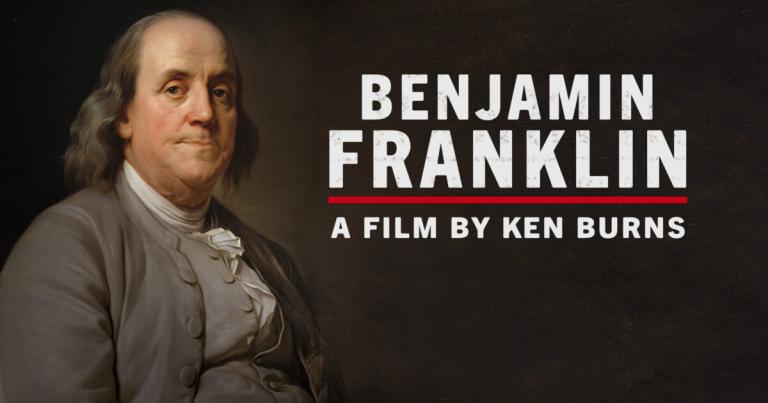
I just finished watching Ken Burns’ latest work, a brilliant two-part documentary about Benjamin Franklin. As a long-time teacher and student of American history, Franklin’s life falls right into my wheelhouse of interest, so I went into this new retrospective armed with substantial prior knowledge about the subject. But as with all of Ken Burns’ films, this masterpiece got me to think about Franklin in ways I had never experienced before. It also opened doors for me to make direct correlations between Franklin’s life and perspectives with different aspects of the modern-day nation he was so instrumental in helping to create; topics ranging from humanitarianism, self-introspection, personal growth, party politics, to religion. If you’d be so kind to read further, I’d like to try to stitch my thoughts together into a reasonably cogent written response to what I got out of the documentary.
Franklin the Humanitarian Deist
Benjamin Franklin could be astoundingly selfless and generous when it came to his contributions to society. Anyone with even an elementary-level knowledge of Ben Franklin knows that he had a brilliant scientific mind and was the inventor of many things that made the world a better place—and continue to do so. His experiments with electricity and lightning led to his development of the lightening rod. This simple but crucial invention has saved untold thousands of lives and structures in the centuries since Franklin came up with the idea. He also developed a new kind of fireplace insert stove (the Franklin Stove) which was much more efficient than anything that had preceded it—versions of it are still in use. He, quite famously, invented bifocal glasses. Franklin even invented a new musical instrument he called the “armonica,” based on the idea of playing glass bowls filled to varying degrees with water by rubbing the rims with dampened fingertips. Franklin designed this concept into a spinning instrument that could be played like a piano keyboard, and it caught on and became quite popular. Any one of these popular and useful inventions could have made Benjamin Franklin a personal fortune. But Franklin, despite the urging of his friends, refused to take out a patent for any of his inventions. He didn’t feel that inventions designed to improve the quality of life for humanity should be used as a method of profiteering. He saw them as gifts for the common good of society. That’s unthinkable in today’s world! Benjamin Franklin was not by any traditional definition a Christian; he was a deist. He believed in a higher power—a creator—but did not ascribe his belief to any particular religious sect or doctrine.
“Here is my creed: I believe in one God, creator of the Universe, that he governs it by his providence, that he ought to be worshiped, that the most acceptable service we render to him is doing good to his other children, that the soul of man is immortal and will be treated with justice in another life respecting its conduct in this. These I take to be the fundamental principles of all sound religion and I regard them in whatever sect I meet with them.”
–Benjamin Franklin
That creed would completely exclude him from the membership of most churches affiliated with Christianity in today’s world, without a doubt. But his views about serving mankind without using it as a means to acquire great personal wealth would certainly appeal to Jesus, I believe. That’s not to say that Franklin wasn’t a wealthy man, he was, but he could have been exponentially wealthier.
Franklin the Self-Reflective Sinner
One of my favorite Benjamin Franklin quotes is this: “Search others for their virtues and yourself for your vices.”
I teach that quote to my students in my history classes. It’s a good one—and it has an indirect biblical connotation with Matthew 7:3: Why do you look at the speck in your brother’s eye, but ignore the plank in your own eye?
Benjamin Franklin was far from a saint. He had the same predilection for all of the vices of the world as any one of us has. But Franklin went out of his way to be his own harshest critic when it came to this. As a young man, Franklin developed a list of virtues to hold himself accountable to. At first the list contained 12 items as follows:
- Temperance: Eat not to dullness, drink not to elevation.
- Silence: Speak not but what may benefit others or yourself; avoid trifling conversation.
- Order: Let all your things have their places; let each part of your business have its time.
- Resolution: Resolve to perform what you ought; perform without fail what you resolve.
- Frugality: Make no expense but to do good to others or yourself, i.e., waste nothing.
- Industry: Lose no time; be always employed in something useful.
- Sincerity: Use no hurtful deceit; think innocently and justly, and, if you speak, speak accordingly.
- Justice: Wrong none by doing injuries, or omitting the benefits that are your duty.
- Moderation: Avoid extremes; forbear resenting injuries so much as you think they deserve.
- Cleanliness: Tolerate no uncleanliness in body, clothes, or habitation.
- Tranquility: Be not disturbed at trifles, or at accidents common or unavoidable.
- Chastity: Rarely use venery (sexual indulgence) but for health or offspring, never to dullness, weakness, or the injury of your own or another’s reputation.
That was Franklin’s original list of virtues. He didn’t just list them, he made a chart and scored himself on each one, point for point, each day. One day, he had done so well with meeting his self-prescribed virtuous expectations that he felt proud and boasted to a friend. The friend looked over the list and suggested that Ben had left one virtue, in particular, off the list. The next day, Franklin had added a thirteenth virtue.
- Humility: Imitate Jesus and Socrates
Franklin’s penchant for self-reflection and self-improvement was a crucial part of what allowed him to evolve over his lifetime. which leads us to the next category.
Franklin the Work in Progress (Personal Growth)
As stated earlier, Franklin was no saint. He was also, like all of us are, a product of his times. But Franklin, unlike many of us, did not choose to remain a product of his times. He sought to learn, to empathize, to evolve, and progress. The most glaring example of this part of Benjamin Franklin’s story is his remarkable evolution when it came to the topic of slavery and race relations. As a young man, Franklin did not value or respect black people very highly. You need only read some of what he wrote in his younger years on the topic to get a very clear picture. He also was a slave owner for much of his early and middle years, not nearly on the order of plantation owners like George Washington or Thomas Jefferson, but a slave owner, nonetheless. By the end of his life, Benjamin Franklin was an outspoken opponent of slavery and a leading abolitionist. What changed? He did. He took the trouble to investigate the matter with an open mind throughout his later years. One moment in particular helped open his eyes and changed his thinking. He visited a school for black children in Philadelphia at the behest of his wife. During his visit, he was extremely impressed with what he saw, writing later that he saw black children learning, performing, and acting no less successfully than white children. It convinced him that he had been wrong in his impressions of racial differences, and, like any good scientist, he began to change his hypothesis, so much so that, in his last year of life, he drafted a letter to Congress urging them to consider abolishing slavery. This was in 1790—the first time the subject had been broached before the newly established government—it was an idea, like so many of Franklin’s, decades ahead of its time. Of course, Congress did not vote to approve Franklin’s suggestion, but it opened the door wide enough for the elephant to stroll into the room where it continues to reside to this very day.
This is the quality I admire most in Franklin. He had every right to let his enormous talent, intellect, and accomplishments—he was revered around the world in an era where Americans were seen as slack-jawed hill jacks—go to his head and make him think that he was all but infallible. Instead, he allowed empathy acquired through life experiences to move him to change. I wish that more of us in this country today would adopt that virtue. Here is what Franklin had to say about the topic:
“The hardest thing for a man to do is to change long-standing prejudices of belief, but to succeed in doing it is a test of one’s humanity.”
–Benjamin Franklin
This leads us directly into the next category.
Franklin the Politician
Benjamin Franklin came to the game of politics later in life. He had already established himself as a successful printer, writer, and a renowned scientist and inventor before he found himself embroiled in the politics of a revolution. But there was a world of difference between politics of colonial America and the politics of today. In the first place, there were no formal political parties. The first two political parties in the U.S. didn’t form until Thomas Jefferson and Alexander Hamilton continually butted heads as part of George Washington’s first cabinet. By that time, Franklin was dead—or dying anyhow. So, in Franklin’s time, compromise was still an art that could be practiced with some success. Were it not so, we’d most certainly never have been able to achieve the monumental accomplishment that was the United States Constitution, another event during which Franklin played a vital role. Although, even then, two distinct schools of thought had already begun to separate themselves, the Federalists and the Antifederalists, the idea of being completely beholden to a rigid political platform had not yet fully taken hold. Franklin was greatly skilled at building bridges instead of walls when it came to politics. Alas, that’s a dying art now.
Today, we have Republicans and Democrats—conservatives and progressives—and neither one seems willing to move an inch toward the center. At least is seems that way at times. In the centuries since the Constitution was written, our country has made great strides forward in so many areas—and we’ve taken great steps backwards in others. Just being able to come to the table with an open mind and empathetic disposition to discuss issues cordially has been replaced by both sides pointing at the other and calling each other pure evil. We have a Republican Party which loves to reminisce about returning to the “good old days,” which never existed in the first place and a Democratic Party that dreams about a future that can likely never be. And lost in the middle of all that is the “right now.” Benjamin Franklin understood that in order to progress into the future, you must be willing to work on the “right now.” That’s what he was getting at when he famously replied to a woman who’d asked him what kind of government they’d come up with in the Constitutional Convention. “A Republic, madam, if you can keep it,” Franklin answered.
We have a Republic for right now, but for how much longer?
Franklin helped get the extremely unlikely compromises done in order to ratify the Constitution so that they could begin to address the problems of “right now.” He understood it wasn’t perfect, but he accepted that it was as close as it was going to get at that point. That’s progress. That’s moving forward. And that seems to be a thing of the past.
Franklin the Religious Guru
As stated earlier, by no stretch of the imagination was Benjamin Franklin what we would call a Christian. He was a somewhere between a deist and a humanist. He could be a very virtuous person but also had all the faults and frailties all humans share. But, in some ways, Benjamin Franklin might well have been one of the most Christ-like of our Founding Fathers. Upon close examination, I think we can find Jesus reflected in Benjamin Franklin much more readily than we can find it in many of our leaders today—both political and religious leaders.
Thanks to Ken Burns for allowing me to see some sides of Ben that I’d never seen before.
It sure makes me wish we had him around today.












